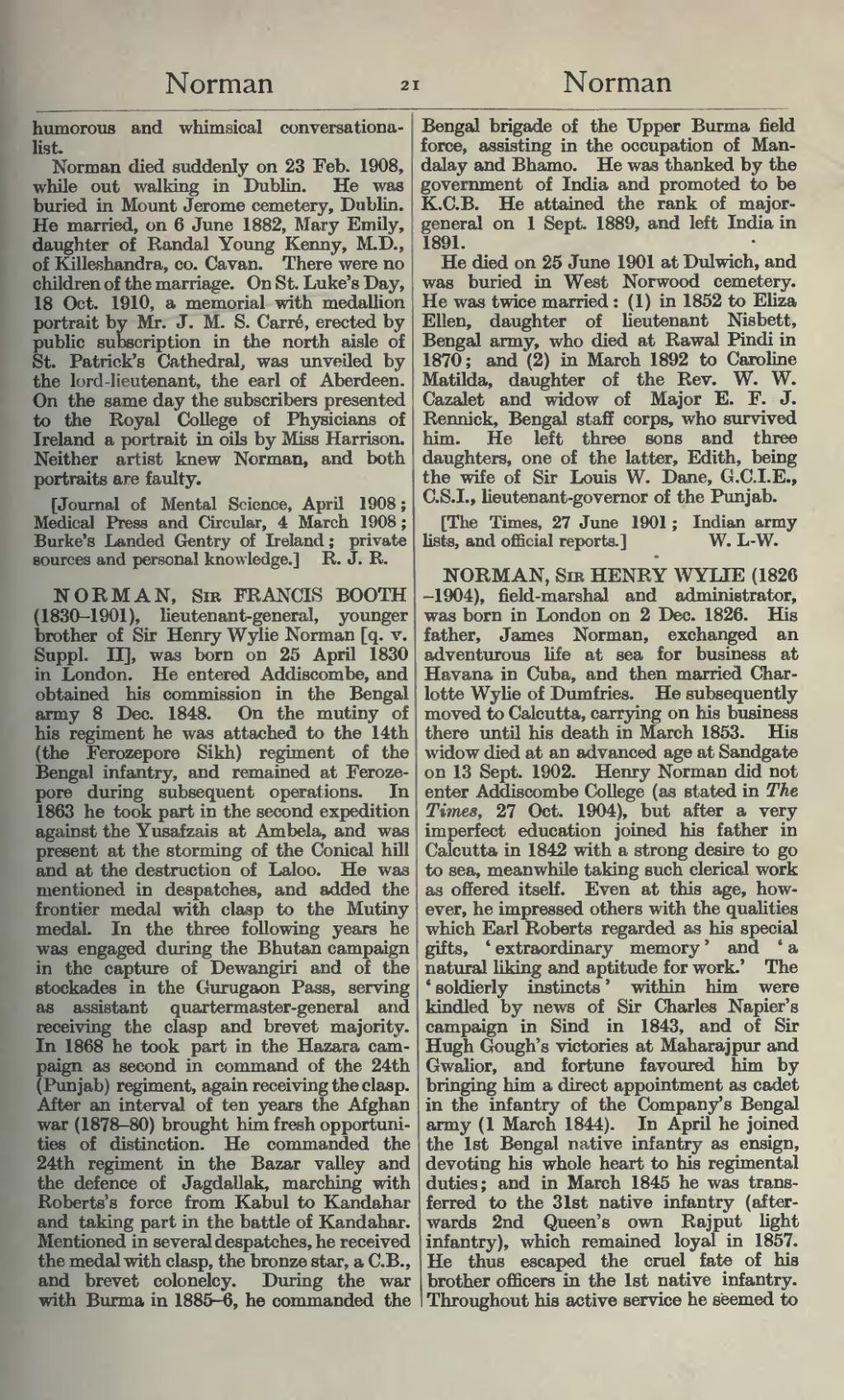humorous and whimsical conversationalist.
Norman died suddenly on 23 Feb. 1908, while out walking in Dublin. He was buried in Mount Jerome cemetery, Dublin. He married, on 6 June 1882, Mary Emily, daughter of Randal Young Kenny, M.D., of Killeshandra, co. Cavan. There were no children of the marriage. On St. Luke's Day, 18 Oct. 1910, a memorial with medallion portrait by Mr. J. M. S. Carré, erected by public subscription in the north aisle of St. Patrick's Cathedral, was unveiled by the lord-lieutenant, the earl of Aberdeen. On the same day the subscribers presented to the Royal College of Physicians of Ireland a portrait in oils by Miss Harrison. Neither artist knew Norman, and both portraits are faulty.
[Journal of Mental Science, April 1908; Medical Press and Circular, 4 March 1908; Burke's Landed Gentry of Ireland; private sources and personal knowledge.]
NORMAN, Sir FRANCIS BOOTH (1830–1901), lieutenant-general, younger brother of Sir Henry Wylie Norman [q. v. Suppl. II], was born on 25 April 1830 in London. He entered Addiscombe, and obtained his commission in the Bengal army 8 Dec. 1848. On the mutiny of his regiment he was attached to the 14th (the Ferozepore Sikh) regiment of the Bengal infantry, and remained at Ferozepore during subsequent operations. In 1863 he took part in the second expedition against the Yusafzais at Ambela, and was present at the storming of the Conical hill and at the destruction of Laloo. He was mentioned in despatches, and added the frontier medal with clasp to the Mutiny medal. In the three following years he was engaged during the Bhutan campaign in the capture of Dewangiri and of the stockades in the Gurugaon Pass, serving as assistant quartermaster-general and receiving the clasp and brevet majority. In 1868 he took part in the Hazara campaign as second in command of the 24th (Punjab) regiment, again receiving the clasp. After an interval of ten years the Afghan war (1878-80) brought him fresh opportunities of distinction. He commanded the 24th regiment in the Bazar valley and the defence of Jagdallak, marching with Roberts's force from Kabul to Kandahar and taking part in the battle of Kandahar. Mentioned in several despatches, he received the medal with clasp, the bronze star, a C.B., and brevet colonelcy. During the war with Burma in 1885-6, he commanded the Bengal brigade of the Upper Burma field force, assisting in the occupation of Mandalay and Bhamo. He was thanked by the government of India and promoted to be K.C.B. He attained the rank of major-general on 1 Sept. 1889, and left India in 1891.
He died on 25 June 1901 at Dulwich, and was buried in West Norwood cemetery. He was twice married: (1) in 1852 to Eliza Ellen, daughter of lieutenant Nisbett, Bengal army, who died at Rawal Pindi in 1870; and (2) in March 1892 to Caroline Matilda, daughter of the Rev. W. W. Cazalet and widow of Major E. F. J. Rennick, Bengal staff corps, who survived him. He left three sons and three daughters, one of the latter, Edith, being the wife of Sir Louis W. Dane, G.C.I.E., C.S.I., lieutenant-governor of the Punjab. [The Times, 27 June 1901; Indian army lists, and official reports.]
NORMAN, Sir HENRY WYLIE (1826–1904), field-marshal and administrator, was born in London on 2 Dec. 1826. His father, James Norman, exchanged an adventurous life at sea for business at Havana in Cuba, and then married Charlotte Wylie of Dumfries. He subsequently moved to Calcutta, carrying on his business there until his death in March 1853. His widow died at an advanced age at Sandgate on 13 Sept. 1902. Henry Norman did not enter Addiscombe College (as stated in The Times, 27 Oct. 1904), but after a very imperfect education joined his father in Calcutta in 1842 with a strong desire to go to sea, meanwhile taking such clerical work as offered itself. Even at this age, however, he impressed others with the qualities which Earl Roberts regarded as his special gifts, 'extraordinary memory' and 'a natural liking and aptitude for work.' The 'soldierly instincts' within him were kindled by news of Sir Charles Napier's campaign in Sind in 1843, and of Sir Hugh Gough's victories at Maharajpur and Gwalior, and fortune favoured him by bringing him a direct appointment as cadet in the infantry of the Company's Bengal army (1 March 1844). In April he joined the 1st Bengal native infantry as ensign, devoting his whole heart to his regimental duties; and in March 1845 he was transferred to the 31st native infantry (afterwards 2nd Queen's own Rajput light infantry), which remained loyal in 1857. He thus escaped the cruel fate of his brother officers in the 1st native infantry. Throughout his active service he seemed to

